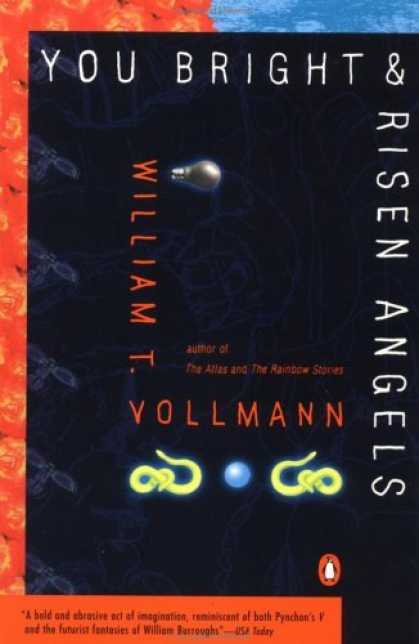Blake Butler
http://www.gillesdeleuzecommittedsuicideandsowilldrphil.com/
Blake Butler lives in Atlanta. His third book, There Is No Year, is forthcoming April 2011 from Harper Perennial.
http://www.gillesdeleuzecommittedsuicideandsowilldrphil.com/
Blake Butler lives in Atlanta. His third book, There Is No Year, is forthcoming April 2011 from Harper Perennial.
Chris Higgs interviews Kristina Born for The Faster Times, about her new book One Hour of Television. [BORN: I wanted it to be suffocating. Gertrude Stein thought (mostly in reference to her plays, I believe) that you can’t write emotional arcs, because if the reader is not in the exact right emotional state at the right stage in the arc, you’ll lose him. Her solution was to put everything on the page immediately, like a painting, and allow the reader to pick out what resonated with him at the time. I’m interested in a different solution: a complete monopoly of mood. I want to try to write in a way where the reader can pick up the book, read any sentence, and be immediately crunched down into the mood he should be in.]
The 15 Most Expensive Paintings in the World seems more interesting than The 50 Sluttiest American Apparel Ads of All Time. But that’s just, like, my opinion, man.
 This second novel by Shane Jones is out now from Fugue State Press and getting excellent and interesting reviews. I like Darby Larson’s thoughts on the book here.
This second novel by Shane Jones is out now from Fugue State Press and getting excellent and interesting reviews. I like Darby Larson’s thoughts on the book here.
Shane is doing a contest on his blog with a giveaway for the book.
In The Failure Six, a group of messengers, who work for a vast bureaucracy, all struggle with the same task – to retell the life story of a woman named Foe who seems to have lost her memory. The irrepressible emotions of the messengers – and Foe’s clear need to be left alone in her amnesia – make for a strange, unaccountable, untellable story.
In this town, speech is accomplished through stacks of paper so tall they touch the sky…the floors of a teahouse are built in seconds…and a mysterious character named DH threatens the town with bombs and his “Deliverer” who wields the world’s most expensive revolvers. The Failure Six is a mystery grounded in Kafka, Gogol, and human dreams.
I read this book in draft and am excited to read it in full and final form. Shane’s got the magic.
Thank god, I’ve been waiting for this: Bolaño Inc.: “The market has its landlords, like everything on this infected planet, and it’s the landlords of the market who decide the mambo that you dance, whether it’s selling cheap condoms or Latin American novels in the U.S.” [Via Matt Kirkpatrick.]
“Hitler had the right idea; he was just an underachiever! Kill’ em all, Adolf! All of ’em! Jew, Mexican, American, White, kill ’em all! Start over, the experiment didn’t work!” – Bill Hicks

The epigraph to the Gordon Lish book I quoted the line about poetry from earlier today is this:
Of the world as it exists,
it is impossible
to be enough afraid.– T. W. Adorno
I got out of bed this morning and looked at that and thought about posting the 4th poem this week from Heather Christle’s The Difficult Farm, and then thought, Gordon Lish, you wrote this book in 1983, and though it is still full of many truths, Heather Christle might have you bushwacked, brother. Because I do not feel a fear in Heather Christle’s poems, and by that I do not mean she is fearless with ideas, though she surely is. I mean these poems feel beyond the realm of fear, in that they have accepted fear, and ate it, and though the fear is warm inside them, they are concerned more with discussing, as in the below ‘Coco Rico,’ whether the person sitting next to you on the Ferris Wheel is an impostor or not, and how warm they might be. Also somehow the hairstyling in the face of this great unspoken black wind among black hens: it is less a blank, and more a waking that has already happened: that inversion I was talking about. More meat than there is air. Beautiful stinging pink meat. Heather Christle is our future soda water (and the sound of a French rooster). Thank you.
There is no epigraph to Heather’s book because it has not arrived to the time in which the rest of the book has arrived. So eat it. And take that, Lish.
Any time you buy anything,
you should buy an extra, in case
you really like it. I am aware
this makes me sound dumb, like
I am a really dumb shopper.
But buried in my shoulder
is a light that swells constantly
from dim to full-on glow and back
and it provides me with endless
knowledge, like a nutritional syrup
for the astronauts whose mania
for leisure’s renowned. Maybe
one day we will be the two
lonely souls forced to sit together
on the Ferris wheel. We will need
a signal. What if when we reach
the top you start humming something
from “The Planets”—then I will know
it’s really you and not some radio DJ
trying to give me another prize.
There are a few things I still
have to tell you, like how women
harvest flowers under unfair
conditions and there are members
of my family with less than
perfect hair. Most importantly,
I must convince you that while
it’s true I have the face of a human,
this does not make me a centaur,
manticore, or great Icelandic king.
I’m sure you’re full of questions,
such as Have you heard we are
surrounded by daffodils of normal
proportions? And all I can tell you
is that yes, we are surrounded,
by daffodils, perhaps, but even
more so we are swimming in an air
that’s been touched here and there
with the kind of dust that, once
lit up, won’t let the swimmers go.
It is all the same to me–the goddamn fancy phony rug, what’s on it and its fucking whereabouts.
Gordon Lish, ‘How to Write a Poem’
Some epigraphs are hokey as a fart. But sometimes they can add a whole new skin on a book’s face. Or they can just be right. Here’s one of my new favs, from Vollmann’s You Bright and Risen Angels:

This book was written by a traitor to his class. It is dedicated to bigots everywhere. Ladies and gentlemen of the black shirts, I call upon you to unite, to strike with claws and kitchen pokers, to burn the grub-worms of equality’s brood with sulfur and oil, to huddle together whispering about the silverfish in your basements, to make decrees in your great solemn rotten assemblies concerning what is proper, for you have nothing to lose but your last feeble principles.
William T. Vollmann, Karachi-Anatuvak Pass – San Francisco, 1981-85
On the page before this it says:
Only the expert will realize that your exaggerations are really true.
Kimon Nicolaides, The Natural Way to Draw
What epigraphs do you like?
 New issue of Salt Hill looks fairly amazing, with new words by some big badasses in Robert Lopez, Eugene Marten, Elisa Gabbert, Joseph Salvatore, Daniel Grandbois, and several others. Salt Hill is always one of the best looking and reading journals around. Excerpts on the site, as well as ordering information.
New issue of Salt Hill looks fairly amazing, with new words by some big badasses in Robert Lopez, Eugene Marten, Elisa Gabbert, Joseph Salvatore, Daniel Grandbois, and several others. Salt Hill is always one of the best looking and reading journals around. Excerpts on the site, as well as ordering information.
A week or two ago I posted about Liam Rector’s use of the Alec Baldwin speech from Glengarry Glen Ross. Here is a later scene in the same movie, a monologue by Al Pacino, which in that context seems to open up the holding in another kind of way–not to subvert it, but to gather out:
Here is a list of people who have disappeared.